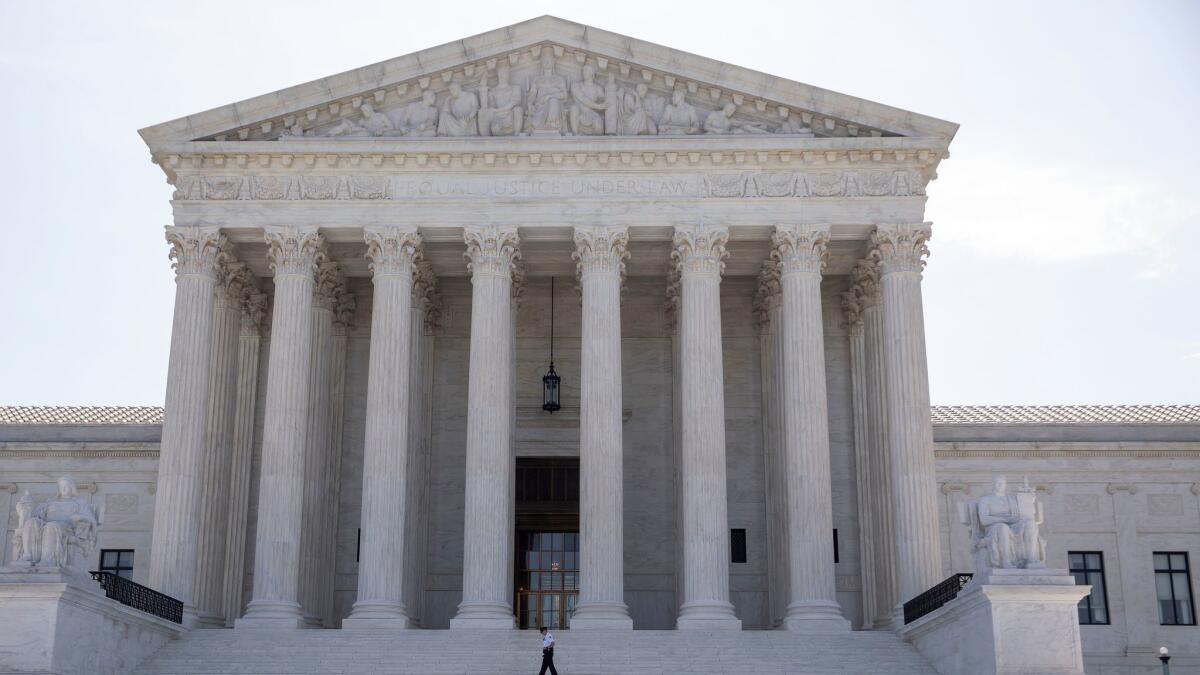Supreme Court says law imposing extra prison time for ‘crime of violence’ is too vague

- Share via
Reporting from Washington — The Supreme Court on Monday struck down part of a 1980s-era crime law that adds longer prison terms for offenders who carried a gun during a “crime of violence,” with Justice Neil M. Gorsuch speaking for the court and Justice Brett M. Kavanaugh in dissent.
The court by a 5-4 vote ruled for two Dallas men who were convicted of robbing several convenience stores and then were given an extra 25 years in prison for carrying a sawed-off shotgun during the crime.
The dispute highlights a sharp difference between President Trump’s two appointees. Gorsuch is a libertarian who is skeptical of the government, and Kavanaugh is a more traditional law-and-order conservative.
Gorsuch, speaking for the court, said the justices should not uphold “vague” laws that do not “give ordinary people fair warning about what the law demands of them.” Maurice Davis and Andre Glover were convicted of robberies. In addition, they were charged with a “conspiracy” to carry a gun during an act that “by its nature, involves a substantial risk that physical force will be used.” That conviction added 25 years to their terms, for a total of about 50 years for Davis and 41 for Glover.
But Gorsuch, joined by the court’s four liberals, said law regarding a “crime of violence” was unconstitutionally vague.
“Vague statutes threaten to hand responsibility for defining crimes to relatively unaccountable police, prosecutors and judges, eroding the people’s ability to oversee the creation of the law they are expected to abide,” Gorusch wrote in United States vs. Davis.
Kavanaugh, in dissent, called the ruling “a serious mistake” and said it would “likely mean that thousands of inmates who committed violent gun crimes will be released far earlier than Congress specified.”
He said the federal crime laws of the 1980s “contributed to the decline of violent crime in America. … Yet today, after 33 years and tens of thousands of federal prosecutions, the court suddenly finds a key provision of [one law] to be unconstitutional because it is supposedly too vague. That is a surprising conclusion.”
The justices also disagreed on what would happen next. Gorsuch said prosecutors could focus on specific crimes when seeking extra prison terms. And he said Congress could pass more specific laws.
Kavanaugh said the ruling could permit thousands of violent criminals to seek their release if they had already served part of their term. “The court’s decision will thwart Congress’ law enforcement policies, destabilize the criminal justice system and undermine safety in American communities,” he said. Chief Justice John G. Roberts Jr. and Justices Clarence Thomas and Samuel A. Alito Jr. joined in dissent.
More to Read
Get the L.A. Times Politics newsletter
Deeply reported insights into legislation, politics and policy from Sacramento, Washington and beyond. In your inbox twice per week.
You may occasionally receive promotional content from the Los Angeles Times.











